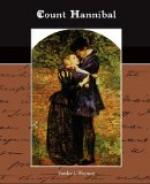“In no danger, Madame!” he cried, interrupting her in astonishment. “Have you seen the gibbet in the Square? Do you call that no danger?”
“It is not erected for you.”
“No?”
“No, Monsieur,” she answered firmly, “I swear it is not. And I know of reasons, urgent reasons, why you should not go. M. de Tavannes”—she named her husband nervously, as conscious of the weak spot—“before he rode abroad laid strict orders on all to keep within, since the smallest matter might kindle the city. Therefore, M. de Tignonville, I request, nay I entreat,” she continued with greater urgency, as she saw his gesture of denial, “you to stay here until he returns.”
“And you, Madame, will answer for my life?”
She faltered. For a moment, a moment only, her colour ebbed. What if she deceived herself? What if she surrendered her old lover to death? What if—but the doubt was of a moment only. Her duty was plain.
“I will answer for it,” she said, with pale lips, “if you remain here. And I beg, I implore you—by the love you once had for me, M. de Tignonville,” she added desperately, seeing that he was about to refuse, “to remain here.”
“Once!” he retorted, lashing himself into ignoble rage. “By the love I once had! Say, rather, the love I have, Madame—for I am no woman-weathercock to wed the winner, and hold or not hold, stay or go, as he commands! You, it seems,” he continued with a sneer, “have learned the wife’s lesson well! You would practise on me now, as you practised on me the other night when you stood between him and me! I yielded then, I spared him. And what did I get by it? Bonds and a prison! And what shall I get now? The same! No, Madame,” he continued bitterly, addressing himself as much to the Carlats and the others as to his old mistress. “I do not change! I loved! I love! I was going and I go! If death lay beyond that door”—and he pointed to it—“and life at his will were certain here, I would pass the threshold rather than take my life of him!” And, dragging La Tribe with him, with a passionate gesture he rushed by her, opened the door, and disappeared in the next room.
The Countess took one pace forward, as if she would have followed him, as if she would have tried further persuasion. But as she moved a cry rooted her to the spot. A rush of feet and the babel of many voices filled the passage with a tide of sound, which drew rapidly nearer. The escape was known! Would the fugitives have time to slip out below?
Some one knocked at the door, tried it, pushed and beat on it. But the Countess and all in the room had run to the windows and were looking out.




